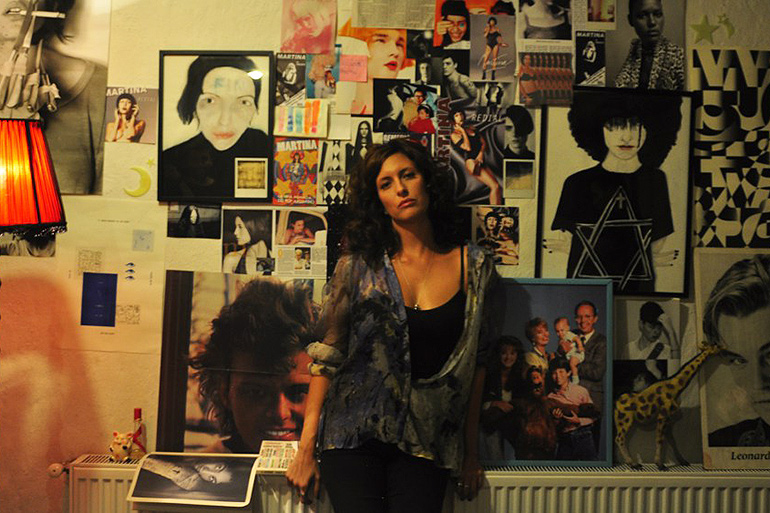Danny Peary Talks to 'Dry Martina' Director Che Sandoval and Star Antonella Costa

The first time I saw the title of Che Sandoval’s new film when it played at the recent 2018 Tribeca Film Festival, I assumed there was a typo. That was before I learned that the young Chilean writer-director’s other two features were amusingly titled You Think You’re the Prettiest (But You’re the Sluttiest) and I’m Much Better Than You, and read about the leading character in the first line of the festival’s synopsis:
“One time Argentinian pop-star Martina (Antonella Costa) has hit rock bottom: no career, no relationship, no sex drive.” So yes, the witty title of this sexy comedy refers to a person rather than a drink, although drinking is one of her many vices.
More from the synopsis: “Chilean fangirl Francisca (an endearing Geraldine Neary) comes to Argentina and pressures her way into Martina’s apartment, revealing that she believes herself to be Martina’s younger half-sister. Martina isn’t interested in Francisca but her handsome boyfriend César (Pedro Campos) catches her eye, stirring her dormant desire. In a flash, though her father is in a coma, she is flying to Chile to pursue this promising young lover….Costa captures Martina’s overconfidence with humor and sensitivity. As she shamelessly pursues sexual fulfillment, with little success, she starts to warm to the idea of being in a new family with her possible sister and her possible biological father, Nacho (Patrico Contreras).”
Film Factory snapped up the rights to Dry Martina so I’m hoping it will get a U.S. theatrical release.
Watch the trailer:
During the festival I had the following conversation with the talented twosome of Sandoval (who is also a serious soccer player) and Costa (Garage Olimpo, The Motorcycle Diaries) about their provocative Chilean-Argentinian movie.

Danny Peary: Che, I haven’t seen your first two films, but I’ve read that some critics referred to them as mumblecore. I don’t see Dry Martina as mumblecore. So have you made a deliberate change in style?
Che Sandoval: I agree that are young people who talk a lot in my early films, but there were strong scripts and a rhythm that you don’t have in mumblecore films. I am inspired by John Cassavetes films, but I don’t think he’s mumblecore either, just inspiration for it.
DP: You went to film school and your first feature, You Think You’re the Prettiest (But You’re the Sluttiest), was your thesis film. Could you have made Dry Martina back then as your thesis film?
CS: No. I needed to be older to make this movie. In my twenties I wasn’t thinking about this movie, and since then I’ve taken small steps to get to where I am. I prefer to go slowly forward and that’s a good thing because I plan on making movies until I’m in my nineties. What is new is that I’m now ready to have female lead character. That was a big challenge for me.
DP: Antonella, do you think you understood Martina better than Che did?
Antonella Costa: I don’t think so. No character in the cinema is known just by the actor or actress. Instead every character is a construction, the result of collaboration. That’s true of Martina.

DP: Che, did you hand Antonella the character and tell her to take it away? Or did you hold her back?
CG: No, I didn’t do that. I don’t really know how I work. I just know that my movies became bigger when I started to really collaborate with other people and the actors. The way I like to work now is to involve my lead actors. In this movie, I involved my lead actress, Antonella, and that made it easier for me to create a complex female character. We discussed all the scenes several times with the other actors and we found the plot of the movie. The Martina that we see at the beginning of the movie was inspired by Antonella’s own story—the father in the hospital, the dead mother, the cat in heat, her being an actress and musician—then during the work, Antonella put a lot of other things into the character.
DP: Antonella, what did you want to put in her?
AC: Freedom. That feeling that pushes her songs. Martina was the most difficult and fun part, because she runs away from everything, including her dying father in the hospital and her music. I always do those things. I have a very strong personality and when I feel angry or upset and see nothing beautiful is going to happen where I am, I run away.
CS: I needed an actress who acts with such freedom. Sometimes I couldn’t explain why I thought Martina should do something but it was instinctual for me. And she did it.
AC: As an actress, I found that Martina is a wonderful character to play because she experiences transitions. There are many strong acts—an act, another act, another act, always pushing forward, but the most important moments for the actress are the transitions between those acts.
DP: So does Martina evolve from one scene—or one act—to the next?
AC: Yes, of course. But not necessarily because she’s learning something or growing up in some sense. I’m talking about a technical topic for an actress—transitions. What happens between one act and another act is for me the most juicy and beautiful moments to act.
CS: Martina does change. At the beginning of the movie, she is alone and empty but later she is alone but full. In her experience in Chile with this new family, she learns for the first time that everything is not about sexuality.
AC: She’d had very little affection in her life before then.
CS: She’s a very tough girl but she’s running away from pain. The scene with the doorman is very important because she realizes that love is more important than sex. There’s another scene in a car and nobody inside has the same kind of love for each other. It seems like a family, which she has never had.
DP: The idea is that Martina finds a new family, Francisca and a new father figure, Nacho.

AC: Yes, I didn’t realize at first that Nacho and Martina have the same personality, so could very well be father and daughter. They both react to things with some volatility.
DP: Do you think Martina’s father in the hospital and Francisca’s father Nacho are similar?
CS: I don’t think so. Nacho is an open guy. All we know about Martina’s father is that he was at odds with her. As I wrote the script, I thought that Martina never talked with her father before. Now that he’s in a coma she talks and talks to him about everything.
AC: When Che was writing the script, my father was in a coma. My life was just like this. There was very much love, but I had a very difficult relationship with my father. When he was in a coma, I started talking to him and reading to him. And I touched him, which I hadn’t done before.
CS: I know a lot about Antonella because we had a relationship for four years, until it ended three years ago. This is difficult to say and maybe she won’t agree with me, but I felt that what she needed was a family. So I think that’s what inspired me to make this movie.
DP: Finding Antonella a family.
AC (laughing): Che is not in my family anymore. He thinks I need a family but I don’t deserve it.
CS: No, no. In Chile, family is very important. In Argentina, where Antonella lived since she came from Italy as a child, it is not as important. They don’t believe as much in institutions. Martina represents Argentina in a way because she doesn’t have a father and mother, and has a dysfunctional family. I didn’t think about that before I wrote the script but now I think I subconsciously was influenced by that.
DP: Does Martina ever judge herself?
AC: No, I don’t think she even judges life. She flies above the facts. Francisca is the one who is always looking for meaning in life, examining every fact.
CS: Martina is always thinking about herself. She is self-absorbed and egotistical.
AC: I don’t agree. Martina has always been accused of being a selfish person. But with her sister, Martina does only those things that don’t really matter to Francisca. She believes that César is not important to Francisca. Francisca keeps saying, “Oh, I don’t care about that guy. I don’t want him anymore. I want another guy.”
So Martina takes him. The only thing that her sister tells Martina not to do is tell her father, Nacho, that she is dating a black man because he’s a racist. She doesn’t tell him. I discovered her morals as I was playing her as a character without morals.
DP: You refer to Francisca as Martina’s sister, but that seems unlikely until we find the truth late in the movie.
AC: Before the DNA test results, they act like sisters.
CS: That’s the idea. From the moment one likes a song and the other doesn’t, they act like sisters.
DP: I want them to be sisters.
AC: Me, too.
CS: That’s important. Martina acts with impunity and then expects Francisca and everyone else to forgive her. I think sisters act that way, knowing the other will forgive them no matter what they do. Martina is selfish with Francisca, but it’s in a tender way. She never had a sister so doesn’t know how to be a big sister.
AC: She was an only child. I am an only child.
CS: Martina loses César because she talks too much about herself. She can’t keep her mouth shut with Francisca about having slept with her boyfriend. She reveals the truth as if no one will react to it.
DP: The bed scene in which she reveals her sexual past to César and he rejects her, he is the one at fault. It’s her shining moment in the film. He’s the jerk.
CS: Yes, he’s the jerk. She’s honest and thinks what he tells her is just life, nothing remarkable. She’s not as dramatic as the other characters who think everything is so big.

DP: Martina seems not to care about anything or anyone—she is self-destructive, even sabotaging her own musical comeback—but I think she is someone who just roles with the punches. When César turns away from her and when the young women in the Martina cover band don’t recognize her because she’s gotten older and lost her fame, she doesn’t breakdown and say, “I gotta get a drink.” She takes it in stride.
AC: Yes, that is the sense of the character. She just goes on. She won’t show her humiliation—never! And not to anyone.
DP: Is that a positive or negative thing?
AC: It’s just the way she is. That’s her way. It’s not to be judged.
DP: Martina doesn’t get mad at César for shaming her, Francisca doesn’t stay mad at Martina for going after her boyfriend.
CS: In my movies, nobody gets angry with another person. In my first movie, two friends do sh_t to each other but neither gets mad and their lives go on. I think with César, Martina realizes he isn’t important. When I was writing the script, I thought that his rejection was the biggest moment, but soon I said, “Oh, no, it’s when they get the DNA result.”
DP: Because by then Francisca is more important to Martina then César.
AC: What makes this film a comedy is that consequences are never too heavy.
DP: Actually when I was watching it, I was unsure if it was a comedy.
CS: I think it’s a dramedy. People watch it and laugh but afterward they think about it and wonder if it is a drama.
DP: Maybe the same script could be done as either a comedy or drama.
AC: No. If this were a drama, the consequences would be awful. She couldn’t leave her comatose father alone in a drama!

CS: Early in the film, before César appears, the scenes between Martina and Francisca aren’t dramatic at all, but amusing. As the movie goes on, Martina learns that some things aren’t as important as she thought and some things aren’t as funny.
DP: We talked before about Martina evolving as she realizes family is more important than a romance, but I was surprised that she never stops trying to pick up guys for sex. She doesn’t change in that way.
CS: In the first version of the script that I wrote three years ago, she wants affection so goes back to her nympho ways. But after a while I changed that and when we edited it we cut out those scenes. But we watched it and realized we were losing a lot. So we put the scenes back but shortened them. I think the scene where she approaches a guy in his truck is important for the politics of the movie. He is taken aback because she is stronger than him.
DP: Antonella, do you think Martina will go back to Chile to see Francisca and Nacho in the future?
AC: I think a second part of this story is needed!
DP: Have you ever played a character like Martina before?
AC: This was a very special character, any actor would dream of playing such a part. This is the first comic role for me. I’ve made 30 films, 20 as the lead, but they were all dramas. My uncle was a very famous comedian in Argentina, so it was a heavy burden for me.
But I’m now very happy because I can do comedy, too! I’m lucky to have played Martina. I’ve always been lucky in cinema. My first film was important and changed my life. I think this will change my life, too.
CS: If the lead actress isn’t good, my movie goes to hell. Antonella gives a beautiful performance.
***This is the eighth interview I have posted from the Tribeca Film Festival. There will be one more in the fall, when Time for Ilham is released theatrically. Norah Shapiro’s super documentary is about immigrant Muslim woman Ilhan Omar’s successful 2016 campaign in Minnesota to become the first Somali-American legislator elected in the United States, and I spoke to the director and her subject about the film and the election. So keep an eye out for that.
***I hope everyone will pick up a copy of my new book with Hana Ali about the origins of her father’s most famous quotes: Ali on Ali: Why He Said What He Said When He Said It. (Workman Publishing)
Danny Peary has published 25 books on film and sports, including Cult Movies and Jackie Robinson in Quotes.



